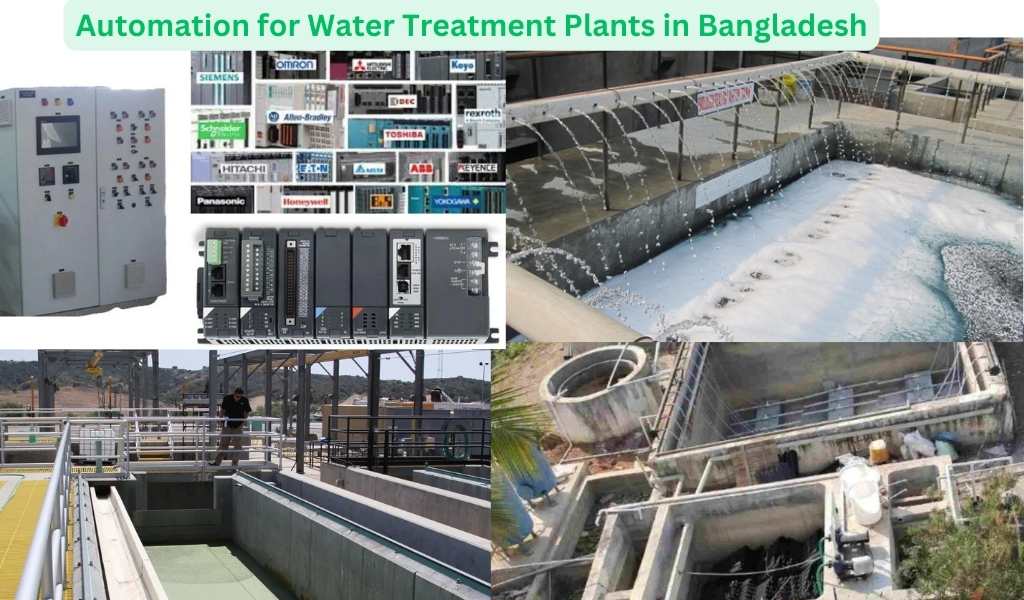Automation System for Water Treatment Plant in Bangladesh
Bangladesh, a nation cradled by mighty rivers and nourishing rain, faces a constant challenge – ensuring clean, accessible water for its thriving population. While nature provides abundantly, water treatment plants play a pivotal role in purifying raw water sources, safeguarding public health, and fostering industrial growth.

Here’s where technology steps in, wielding a mighty weapon: automation. PLC (Programmable Logic Controllers), the workhorses of industrial automation, become the brains of the operation in a water treatment plant. These compact yet powerful devices orchestrate a symphony of pumps, valves, chemical dosing systems, and filtration units.
But automation is more than just a fancy switch. SCADA (Supervisory Control and Data Acquisition) systems act as the watchful eyes and ears. Imagine a virtual control room, displaying real-time data on water flow, pressure, chemical levels, and even equipment health. Operators can monitor the entire process, intervene when necessary, and generate detailed reports – all from a central hub.
The benefits of automation in Bangladeshi water treatment plants are as vast as the Bay of Bengal itself. Let’s dive into a few key advantages:
- Enhanced Efficiency: Automation eliminates manual processes, streamlining operations and reducing human error. Imagine a world where chemical dosing is precise, pump operations are optimized, and backwashing cycles are automated – that’s the power of automation.
- Improved Water Quality: Consistent monitoring and precise control over treatment parameters lead to a more consistent and reliable treated water quality. This is especially crucial for municipal water treatment where even minor fluctuations can impact public health.
- Reduced Costs: Automation translates to efficient use of chemicals and energy, leading to significant cost savings. Additionally, reduced maintenance needs and extended equipment lifespan contribute to a healthier bottom line.
- Remote Monitoring: SCADA systems allow for remote monitoring of the plant. This is a game-changer for geographically dispersed plants or those in remote locations. Operators can identify and address issues promptly, minimizing downtime and ensuring smooth operation.
- Environmental Sustainability: Automation enables optimal use of resources, reducing chemical waste and minimizing energy consumption. This fosters a more sustainable approach to water treatment, aligning with Bangladesh’s growing commitment to environmental responsibility.
The cost of automating a water treatment plant in Bangladesh depends on several factors, including plant size, treatment complexity, and the chosen level of automation. However, the long-term benefits often outweigh the initial investment. Government initiatives and grants promoting automation in water infrastructure can further incentivize these upgrades.
Government Regulations for Water Treatment Plants in Bangladesh play a crucial role in ensuring treated water quality. The Bangladesh Bureau of Standards (BBS) sets stringent water quality parameters, and automation helps treatment plants consistently meet these standards.
When it comes to automation solutions, Bangladeshi companies are rising to the challenge. Several water treatment plant automation companies in Bangladesh offer customized solutions catering to the specific needs of industrial and municipal treatment facilities.
Now, let’s delve deeper into the diverse applications of automation in Bangladeshi water treatment:
- Industrial Water Treatment Automation: Industries like textile, pharmaceuticals, and power generation rely heavily on treated water. Automation ensures a consistent supply of water with the desired quality parameters, optimizing industrial processes and product quality.
- Municipal Water Treatment Automation: With a burgeoning population, ensuring safe drinking water for all Bangladeshis is paramount. Automation in municipal water treatment plants guarantees consistent water quality across the distribution network, safeguarding public health.
- Drinking Water Treatment Plant Automation: For facilities dedicated solely to producing drinking water, automation offers an extra layer of security. Precise control over disinfection processes and filtration systems ensures the highest quality drinking water reaches every household.
The future of water treatment in Bangladesh is undeniably intertwined with automation. Remote monitoring capabilities will allow for even more proactive management of treatment plants. Integration with cloud-based solutions can offer real-time data analysis and predictive maintenance, leading to further efficiency gains.
By embracing automation, Bangladesh can ensure a brighter future for its water resources. Clean, accessible water not only sustains lives but also fuels economic growth and fosters a healthier environment. Investing in automation is an investment in the nation’s well-being, a ripple effect that will be felt for generations to come.
FAQs
What are the benefits of automating a water treatment plant?
Automation improves efficiency, water quality, and reduces costs. Remote monitoring allows for faster issue resolution and promotes sustainability through optimized resource use.
How much does it cost to automate a WTP in Bangladesh?
The cost varies depending on plant size and complexity. However, long-term benefits like cost savings and improved efficiency often outweigh the initial investment. Government grants can also help offset costs.
Who offers automation solutions for water treatment plants in Bangladesh?
Several Bangladeshi companies specialize in water treatment plant automation. They design customized solutions to meet the specific needs of industrial and municipal facilities.
